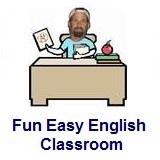|
|
| |
|
|
| |
|
|
| Fun Easy English Classroom April 30 |
|
| |
Classroom
Today
Learn American
English vocabulary
beginning with
letter C |
|
 American
English Vocabulary American
English Vocabulary
Today in the classroom you are going to learn some
words you should know beginning with the letter C. |
 Hey
if you cannot understand something on this page, Hey
if you cannot understand something on this page,
then use the Fun Easy English
dictionary
(opens in a new window) |
|
|
|
American English Vocabulary - Letter
C
The words on this page came from the VOA, Voice of
America, Special English Word Book.
Use the Fun Easy English
dictionary
for a more detailed explanation of each word. |
-
cabinet - n. a group of ministers that helps
lead a government
- call
- v. to give a name to ("I call myself John."); to
ask for or request ("They called for an end to the
fighting.")
- calm
- ad. quiet; peaceful; opposite tense
- camera
- n. a device for taking pictures
- camp
- n. a place with temporary housing
-
campaign - n. a competition by opposing
political candidates seeking support from voters; a
connected series of military actions during a war
- can
- v. to be able to; to have the right to; n. a
container used to hold liquid or food, usually made
of metal
- cancel
- v. to end; to stop
- cancer
- n. a disease in which dangerous cells grow quickly
and destroy parts of the body
-
candidate - n. a person who seeks or is
nominated for an office or an honor
-
capital - n. the official center of a
government; the city where a country's government is
-
capture - v. to make a person or animal a
prisoner; to seize or take by force; to get control
of
- car
- n. a vehicle with wheels used to carry people; an
automobile; a part of a train
- care
- v. to like; to protect; to feel worry or interest
- career
- n. a chosen profession; a person’s working life
("The actor’s career lasted for thirty years.")
-
careful - ad. acting safely; with much
thought
- carry
- v. to take something or someone from one place to
another
- case
(court) - n. a legal action
- case
(medical) - n. an incident of disease ("There was
only one case of chicken pox at the school.")
- cat
- n. a small animal that often lives with humans
- catch
- v. to seize after a chase; to stop and seize with
the hands
- cause
- v. to make happen; n. the thing or person that
produces a result
-
ceasefire - n. a halt in fighting, usually by
agreement
-
celebrate - v. to honor a person or event
with special activities
- center
- n. the middle of something; the place in the
middle; a place that is the main point of an
activity
-
century - n. one hundred years
-
ceremony - n. an act or series of acts done
in a special way established by tradition
-
chairman - n. a person leading a meeting or
an organized group
-
champion - n. the best; the winner
- chance
- n. a possibility of winning or losing or that
something will happen
- change
- v. to make different; to become different
- charge
- v. to accuse someone of something, usually a
crime; n. a statement in which someone is accused of
something
- chase
- v. to run or go after someone or something
- cheat
- v. to get by a trick; to steal from
- cheer
- v. to shout approval or praise
-
chemicals - n. elements found in nature or
made by people; substances used in the science of
chemistry
-
chemistry - n. the scientific study of
substances, what they are made of, how they act
under different conditions, and how they form other
substances
- chief
- n. the head or leader of a group; ad. leading;
most important
- child
- n. a baby; a boy or girl
-
children - n. more than one child
- choose
- v. to decide between two or more
- circle
- n. a closed shape that has all its points equally
distant from the center, like an "O"
-
citizen - n. a person who is a member of a
country by birth or by law
- city
- n. any important large town
-
civilian - ad. not military
- civil
rights - n. the political, economic and
social rights given equally to all people of a
nation
- claim
- v. to say something as a fact
- clash
- n. a battle; v. to fight or oppose
- class
- n. a group of students who meet to study the same
subject; also, a social or economic group. ("They
were members of the middle class.")
- clean
- v. to make pure; ad. free from dirt or harmful
substances ("clean water")
- clear
- ad. easy to see or see through; easily understood
- clergy
- n. a body of officials within a religious
organization
-
climate - n. the normal weather conditions of
a place
- climb
- v. to go up or down something by using the feet
and sometimes the hands
- clock
- n. a device that measures and shows time
- close
- v. to make something not open; ad. near to
- cloth
- n. a material made from plants, chemicals, animal
hair and other substances
-
clothes - n. what people wear
- cloud
- n. a mass of fog high in the sky
- coal
- n. a solid black substance used as fuel
-
coalition - n. forces, groups or nations
joined together
- coast
- n. land on the edge of the ocean
- coffee
- n. a drink made from the plant of the same name
- cold
- ad. not warm; having or feeling great coolness or
a low temperature
-
collapse - v. to fall down or inward
suddenly; to break down or fail suddenly in
strength, health or power. ("The building collapsed
in the earthquake.” “The government collapsed after
a vote in parliament.")
-
collect - v. to bring or gather together in
one place; to demand and receive ("collect taxes")
-
college - n. a small university
- colony
- n. land controlled by another country or
government
- color
- n. the different effects of light on the eye,
making blue, red, brown, black, yellow and others
-
combine - v. to mix or bring together
- come
- v. to move toward; to arrive
-
command - v. to order; to have power over
something
-
comment - v. to say something about; to
express an opinion about something
-
committee - n. a group of people given
special work
- common
- ad. usual; same for all ("a common purpose")
-
communicate - v. to tell; to give or exchange
information
-
community - n. a group of people living
together in one place or area
-
company - n. a business organized for trade,
industrial or other purposes
-
compare - v. to examine what is different or
similar
-
compete - v. to try to do as well as, or
better than, another or others
-
complete - ad. having all parts; ended or
finished
-
complex - ad. of or having many parts that
are difficult to understand; not simple
-
compromise - n. the settlement of an argument
where each side agrees to accept less than first
demanded
-
computer - n. an electronic machine for
storing and organizing information, and for
communicating with others
-
concern - n. interest, worry ("express
concern about"); v. to fear ("to be concerned")
-
condemn - v. to say a person or action is
wrong or bad
-
condition - n. something declared necessary
to complete an agreement; a person's health
-
conference - n. a meeting
-
confirm - v. to approve; to say that
something is true
-
conflict - n. a fight; a battle, especially a
long one
-
congratulate - v. to praise a person or to
express pleasure for success or good luck
-
Congress - n. the organization of people
elected to make the laws of the United States (the
House of Representatives and the Senate); a similar
organization in other countries
-
connect - v. to join one thing to another; to
unite; to link
-
conservative - n. one who usually supports
tradition and opposes great change
-
consider - v. to give thought to; to think
about carefully
-
constitution - n. the written general laws
and ideas that form a nation's system of government
-
contact - n. the act of touching or being
close to a person or thing ("He was in contact with
animals that had the disease.") v. to meet or
communicate with ("He wanted to contact his local
official.")
-
contain - v. to hold; to include
-
container - n. a box, bottle or can used to
hold something
-
continent - n. any of the seven great land
areas of the world
-
continue - v. to go on doing or being
-
control - v. to direct; to have power over
-
convention - n. a large meeting for a special
purpose
- cook
- v. to heat food before eating it
- cool
- ad. almost cold
-
cooperate - v. to act or work together
- copy
- v. to make something exactly like another; n.
something made to look exactly like another
- corn
- n. a food grain
-
correct - ad. true; free from mistakes; v. to
change to what is right
-
corruption - n. actions taken to gain money
or power that are legally or morally wrong
- cost
- n. the price or value of something ("The cost of
the book is five dollars."); v. to be valued at
("The book costs five dollars.")
- cotton
- n. a material made from a plant of the same name
- count
- v. to speak or add numbers
-
country - n. a nation; the territory of a
nation; land away from cities
- court
- n. where trials take place; where judges make
decisions about law
- cover
- v. to put something over a person or thing; n.
anything that is put over a person or thing
- cow
- n. a farm animal used for its milk
- crash
- v. to fall violently; to hit with great force
- create
- v. to make; to give life or form to
-
creature - n. any living being; any animal or
human
- credit
- n. an agreement that payments will be made at a
later time
- crew
- n. a group of people working together
- crime
- n. an act that violates a law
-
criminal - n. a person who is responsible for
a crime
- crisis
- n. an extremely important time when something may
become much better or worse; a dangerous situation
-
criticize - v. to say what is wrong with
something or someone; to condemn; to judge
- crops
- n. plants that are grown and gathered for food,
such as grains, fruits and vegetables
- cross
- v. to go from one side to another; to go across
- crowd
- n. a large number of people gathered in one place
- crush
- v. to damage or destroy by great weight; to defeat
completely
- cry
- v. to express or show sorrow or pain
-
culture - n. all the beliefs, traditions and
arts of a group or population
- cure
- v. to improve health; to make well ("The doctor
can cure the disease."); n. something that makes a
sick person well ("Antibiotics are a cure for
infection.")
- curfew
- n. an order to people to stay off the streets or
to close their businesses
-
current - n. movement of air, water or
electricity; ad. belonging to the present time ("She
found the report in a current publication.")
- custom
- n. a long-established belief or activity of a
people
-
customs - n. taxes on imports
- cut
- v. to divide or injure with a sharp tool; to make
less; to reduce
|
|
 From
YOUR Teacher: Words You Should Know From
YOUR Teacher: Words You Should Know
Fun Easy English Words You Should Know comes from
the VOA, Voice of America, Special English Word Book
Vocabulary. Special English, now called Learning
English, consists of 1,500
essential words which anyone learning English should know. |
|
News
Words - Letter C
The videos on this page came from the VOA, Voice of
America, News Words program.
Use the Fun Easy English
dictionary
for a detailed explanation of words you do not understand.
Click the full screen button on the
video to make it easier to watch and to read the
video script. |
|
Word |
Video |
|
|
Candidate |
|
|
| Capitol
Hill |
|
|
|
Caravan |
|
|
|
Casualty |
|
|
|
Catastrophic |
|
|
|
Censorship |
|
|
|
Chaos |
|
|
|
Chemical Weapons |
|
|
|
Chronic |
|
|
|
Civil War |
|
|
|
Coding |
|
|
|
Collusion |
|
|
|
Combat |
|
|
|
Confidential |
|
|
|
Confine |
|
|
|
Confront |
|
|
|
Consensus |
|
|
|
Construction |
|
|
|
Consumer |
|
|
|
Convoy |
|
|
|
Corona |
|
|
|
Cosmetics |
|
|
|
Credibility |
|
|
|
Crippling |
|
|
|
Critical |
|
|
|
Cronyism |
|
|
|
Crude |
|
|
|
Culpable |
|
|
|
Cyberattack |
|
|
|
|
|
|
Additional Lessons |
 About These
Lessons About These
Lessons
The following classroom lessons are great for students
who want additional conversation, listening, and reading
practice. |
-
Conversation Lesson -
Intermediate
Level. Dialogs for everyday use.
Short situational dialogs for students of English as
a Foreign (EFL) or Second (ESL) Language with a
written conversation and a conversation notes
section.
|
 Conversation Lesson
8 - Near Accident Conversation Lesson
8 - Near Accident
(Intermediate -
Conversation, Reading)
Dialogs for everyday use. Short situational dialogs for
students of English as a Foreign (EFL) or Second (ESL)
Language. |
Near Accident
Quinn: How about
that!
Kerwin: What? What happened?
Quinn: Did you see what that
guy did?
Kerwin: No. I was
looking the other way.
Quinn: He made a
Uturn right in the middle of the block and almost hit a kid on a
bicycle.
Kerwin: Drivers get crazier every day!
Quinn: Right. Nobody wants to drive by the
rules anymore! |
|
Conversation Notes |
- Near accident
- almost an accident
- How about that
- Just consider what happened!
- guy
- man
- I was looking the other way
- I was looking in the opposite direction
- Uturn
- turn a vehicle such as a car or truck in the shape of a
U
|
|
Source: U.S. State Department |
|
Additional Conversation |
 Conversation Conversation
This is a collection of 30 situational conversations
which focus on a wide variety of communicative and
natural encounters in English....these
lessons are for beginning students. |
 Conversation Conversation
This is a collection of 30 situational conversations. Each conversation is
accompanied by language notes....these
lessons are for advanced students. |
 Conversation Conversation
English conversation lessons. 52
lessons covering pronunciation, speaking,
writing, and grammar topics....these
lessons are for beginning students. |
 Conversation Conversation
English conversation lessons. 30
lessons focusing mostly on communication and
grammar topics....these
lessons are for intermediate students. |
|
|
|
|
|
|
|
 Hey Students, Hey Students,
Use this dictionary and reference to look up any words you do not
understand in Fun Easy English.
Note: search opens in a new tab. |
|
|
|
|
|
Search Fun Easy English |
|
|
|
|
|
|
|
|
|
|
|
|
|
|
|
About
Contact
Copyright
Resources
Site Map |